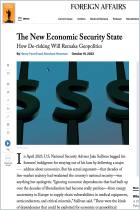Únase a getAbstract para acceder al resumen.

Únase a getAbstract para acceder al resumen.
Richard Haass
The Dangerous Decade
A Foreign Policy for a World in Crisis
Foreign Affairs, 2022
¿De qué se trata?
The 2020s are seeing a convergence of perils old and new, requiring a novel approach.
Recommendation
Shifting alliances in a world that has seen a resurgent China, a bellicose Russia and an attenuated America spell trouble, writes foreign policy expert Richard Haass in this sobering assessment. At a time in which the West no longer predominates and power is dispersed among a greater number of states, America needs to strengthen its defenses and maintain diplomatic channels with Russia and China. According to Haass, what America seeks to gain may be less important than what it needs to avoid.
Summary
About the Author
Richard Haass is the president of the Council on Foreign Relations.


















Comment on this summary